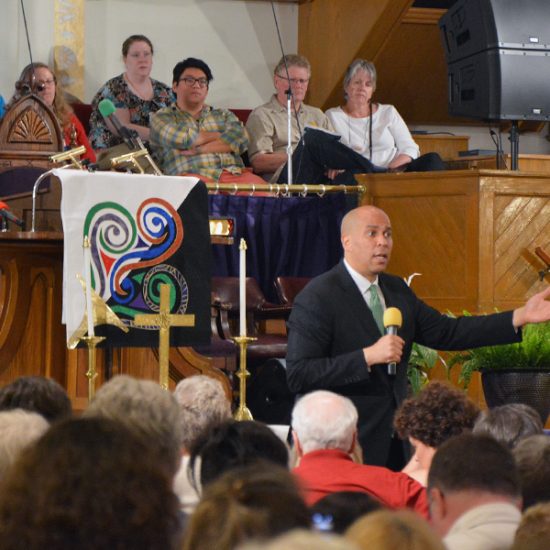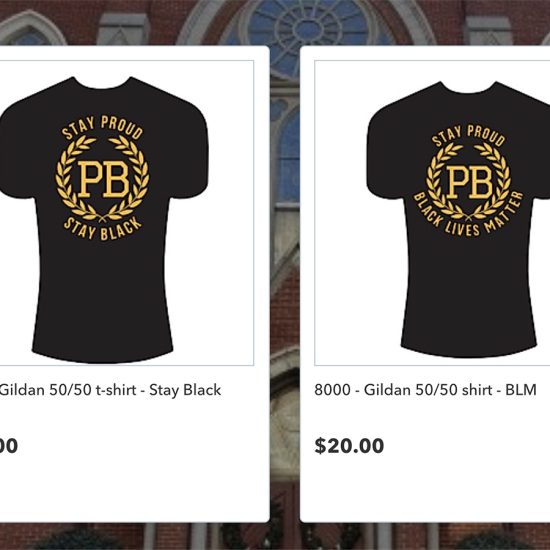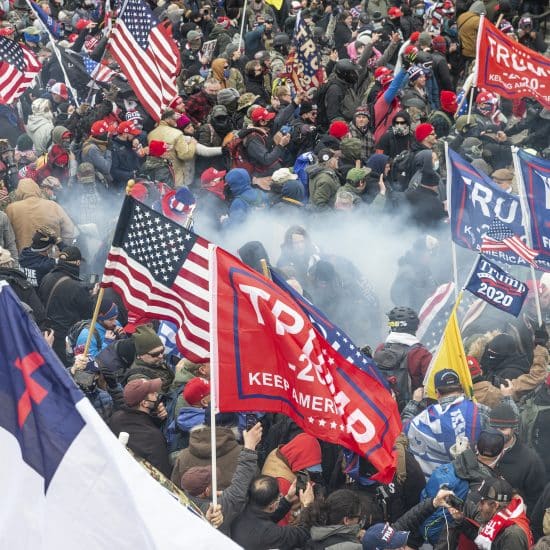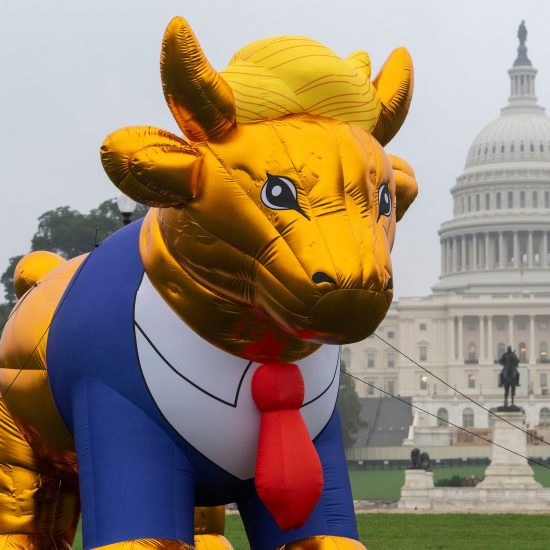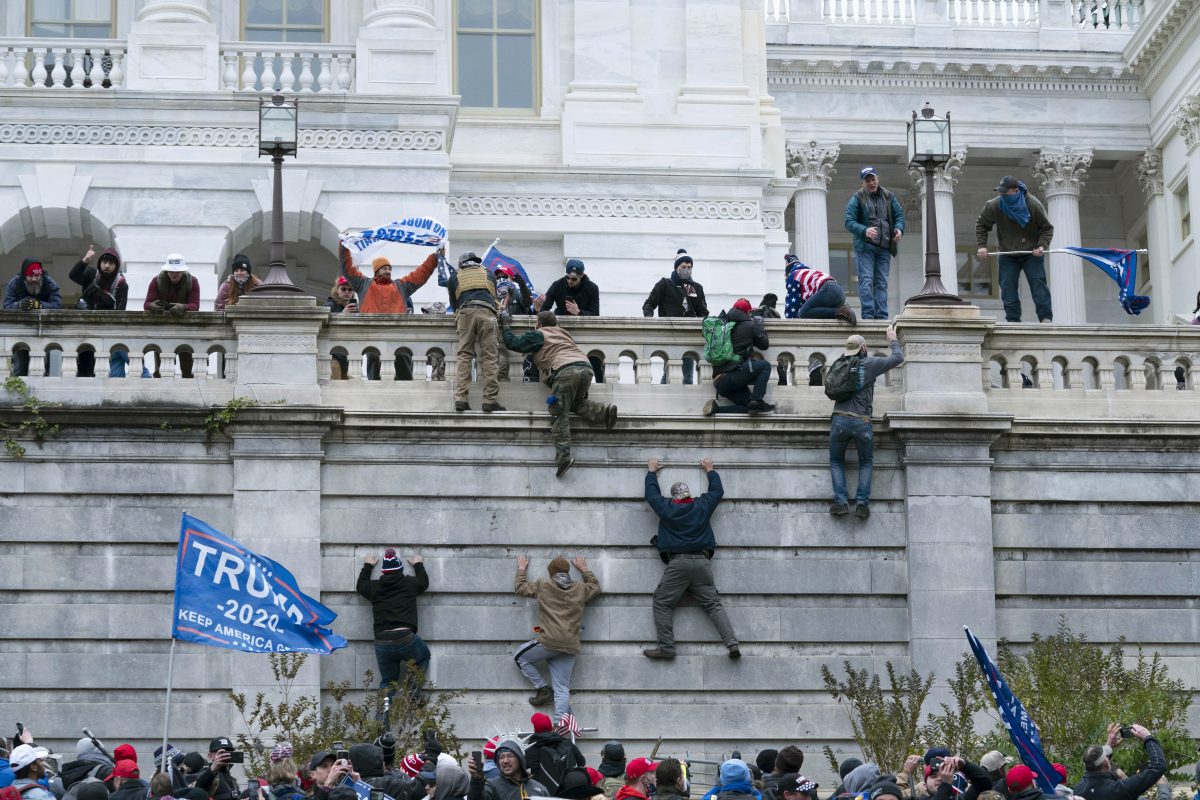
In the midst of attempting to dissect which forces enabled the January 6th violent attack against the U.S. Capitol building, more attention should be been given to the powerful role of the religious right. Flags and signs at the anti-democratic rally, as well as interviews with the participants, reveal that many of the participants were driven by Christian fundamentalist beliefs. It is important for a serious reckoning and repentance by religious leaders who have blindly led their congregants into this evil path.
The attack on the U.S. house of democracy was not only an act of domestic terrorism but it had an international element. In addition to the pro-slavery Confederate flag, another foreign flag that was highly visible during the fascist protests was the Israeli flag.
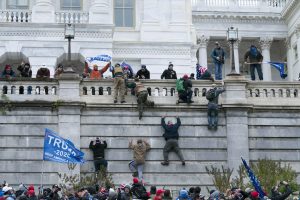
Supporters of President Donald Trump climb the west wall of the the U.S. Capitol on Jan. 6, 2021, in Washington, D.C. (Jose Luis Magana/Associated Press)
While the totalitarianism of an American president and politicians will tarnish America’s image as a beacon of democracy, the enabling role of Christian fundamentalist leaders will have a long effect on people of faith around the world. Such public connection of the mobs with Christian symbols will have a long-term mark on followers of Christ around the world and especially in the Arab region.
For decades, U.S. foreign policy leaders have justified their biased support for Israel on the basis of shared values. The mistaken claim that Israel was a democracy allowed the blind American support to a country that discriminates against its own non-Jewish citizens and has been occupying five million Palestinians for decades and denying them the basic right of self-determination.
An ugly marriage between Christian fundamentalists and right-wing pro-Israeli Zionists was forged with the aim of enabling Israel and denying Palestinian human rights. Christian and Jewish Zionism have been the hallmarks of the Trump administration from day one and were clearly on display in its final days. Yet a wall of silence remains about their ugly anti-human rights treatment of Palestinians.
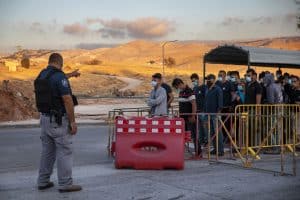
Palestinians laborers line up to cross a checkpoint at the entrance to the Israeli settlement of Maale Adumim, near Jerusalem, on June 30, 2020. (Oded Balilty/Associated Press)
Christian televangelists were preaching the gospel of total blind support for Israel while their congregants followed them without discernment or question. Even the attempts to explain the existence of fellow Christian believers among the oppressed Palestinian people did little to quell the partisan support to an immoral leader that was justified simply because he appointed anti-abortion judges. Pro-Israeli televangelists clutched to Trump’s coattails despite the writing on the wall, the immorality, and the anti-democratic rhetoric and actions by the president and his cabal of political supporters.
They justified anti-Muslim executive orders and anti-immigration action that separated mothers from their children, seemingly forgetting the biblical commands of “love thy neighbor as yourself.” They supported the rich at the expense of the poor, ignoring Jesus’s fundamental sermon on the mount and his repeated alignment with the poor and the needy. They encouraged war against Iran and turned a blind eye to the bone-sawing of a Saudi journalist, totally ignoring the importance of life while being fixated on the claim that they are pro-life Christian leaders.
Unlike the issue of politics which is the art of the possible, religion and religious leaders talk in terms of absolutes. Politicians can and often change positions based on their interests and political winds, but religious leaders constantly tell us that they are messengers of the Almighty and that their words and positions are absolute and not open for discussion or debate. During the Trump era, many Christian and right-wing pundits insisted on the use of the term Islamic terrorism. The inclusion of religion was wrong as it is wrong now to call what happened at teh Capitol part of Christian terrorism. But that doesn’t excuse Christian fundamentalist leaders for their role.
Fundamentalist leaders who have enabled this monstrous president will likely escape criticism. But a serious effort to deal with the motivation that led to the violence on January 6th can’t ignore the role of Christian leaders who provided the ideological fuel to this carnage. Unfortunately, their role and the effect of their words and actions are not limited to the borders of the United States.
The role of religion has been identified in the terrorism from September 11th to the ISIS caliphate. Fundamentalist Muslims have fought back, calling the American-led war on them as being a ‘crusader’ attack. This was rejected by American defenders saying that America is a secular country that separates religion from politics. Unfortunately, the role of religion in the Trump era can no longer be denied. The big question now is whether those religious fundamentalist leaders will be held accountable for their despicable words and actions.
The Bible talks about educators and leaders who through their teaching set a bad role model. The Gospel of Mathew reflects the harshest punishment possible for those who set a bad example: “But if anyone causes one of these little ones who believe in me to stumble, it would be better for him to have a large millstone hung around his neck and to be drowned in the depths of the sea.”
Daoud Kuttab is an award-winning Palestinian Christian journalist and former Ferris Professor of Journalism at Princeton University. Follow him on twitter @daoudkuttab

